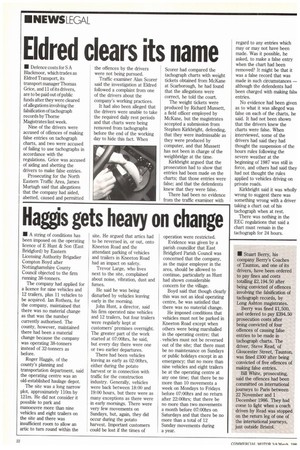Eldred clears its name
Page 24

If you've noticed an error in this article please click here to report it so we can fix it.
• Defence costs for S A BlacImioor, which trades as Eldred Transport, its transport manager Thomas Grice, and 11 of its drivers, are to be paid out of public funds after they were cleared of allegations involving the falsification of tachograph records by Thorne Magistrates last week.
Nine of the drivers were accused of offences of making false entries on tachograph charts, and two were accused of failing to use tachographs in accordance with the regulations. Grice was accused of aiding and abetting the drivers to make false entries.
Prosecuting for the North Eastern Traffic Area, James Murtagh said that allegations that the company had aided, abetted, caused and permitted the offences by the drivers were not being pursued.
Traffic examiner Alan Scorer said the investigation at Eldred followed a complaint from one of the drivers about the company's working practices.
It had also been alleged that the drivers were unable to take the required daily rest periods and that charts were being removed from tachographs before the end of the working day to hide this fact. When Scorer had compared the tachograph charts with weight tickets obtained from McKane at Scarborough, he had found that the allegations were correct, he told the court.
The weight tickets were produced by Richard Mussett, a field officer employed by McKane, but the magistrates accepted a submission from Stephen Kirkbright, defending, that they were inadmissable as they were produced by computer, and that Mussett has not been in charge of the weighbridge at the time.
Kirkbright argued that the prosecution had to show that entries had been made on the charts; that those entries were false; and that the defendents knew that they were false.
There had been no evidence from the traffic examiner with regard to any entries which may or may not have been made. Was it possible, he asked, to make a false entry when the chart had been removed? It might be that it was a false record that was made in such circumstances — although the defendents had been charged with making false entries.
No evidence had been given as to what it was alleged was false on each of the charts, he said. It had not been shown that the drivers knew the charts were false. When interviewed, some of the drivers had said they had thought the suspension of the hours rules following the severe weather at the beginning of 1987 was still in force, and others had said they had not thought the rules applied to vehicles driving on private roads.
Kirkbright said it was wholly wrong to suggest there was something wrong with a driver taking a chart out of his tachograph when at rest.
There was nothing in the EEC regulations that said a chart must remain in the tachograph for 24 hours.




























































































